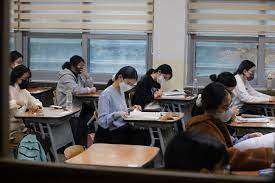Subscribe
Subscribe Now to receive Goldsea updates!
- Subscribe for updates on Goldsea: Asian American Supersite


Staffers at one of S. Korea’s most successful English test cram schools were indicted Monday for recording questions from official English language proficiency tests over a four-year period.
Hackers Group chairman, surnamed Cho, ordered about 50 staffers to sit for 49 Test of English for International Communication (TOEIC) and 57 Test of English Proficiency (TEPS) examinations to steal the copyright-protected questions between 2007 and early 2011, said Seoul Central Prosecutors Office Monday.
“Through organized efforts to leak test questions, Hackers Group was able to achieve W100 billion ($90 mil.) in annual sales and W36 billion ($33 mil.) in net profit just eight years after its establishment,” said a prosecution spokesman.
He blamed the widespread use of such practices on lax attitudes toward copyrights and the belief that any means are justified to achieve high standardized test scores.
Hackers Group staffers memorized or used electronic devices to record the questions, then posted them on the company’s website almost in real time. They were deleted the next morning to avoid detection. The company then used its native English-speaking teachers review and revise questions for use in the school’s teaching materials.
Hackers Group issued a statement denying the accusations.
“The copying of test materials is a practice that has gone on in the industry for a long time and we either modified the test questions or created new ones based on them,” it said. “It does not constitute copyright violation. We regret the use of devices, but the questions that appeared in a test do not appear in a test again, so we did not interfere with the business of other companies.”
Exam takers generally believe that the copying of test questions is common practice among language institutes.
“Students have no qualms about asking me to share test questions with them,” an instructor at a Seoul language institute told Chosun Ilbo. “A lot of students are not interested in improving their language skills but only in getting high scores.”
English cram schools have proliferated in S. Korea with the surging demand for English-proficient professionals, business executives and civil servants. Most S. Korean students claim that the English-language exams are the most burdensome part of their educations.
